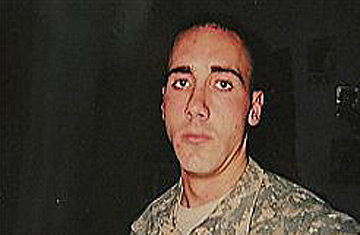
Staff Sergeant Raymond L. Girouard
Staff Sergeant Raymond L. Girouard, 24, went on trial Tuesday, defending himself against charges of premeditated murder, obstruction of justice and other charges for ordering soldiers in his squad to kill three unarmed Iraqi detainees and conspiring to cover up the deaths. The case is one among several that have inflamed critics of the U.S. The prosecution has also stirred anger among Girouard's hometown supporters, who say he is being made a scapegoat in the case.
The question at the heart of Girouard's case is whether he ordered three Iraqi men killed during a raid last May in the Thar Thar Canal. During the raid, soldiers took four men captive. Shortly before the soldiers were supposed to pull out, three of the detainees were allegedly shot by two soldiers in Girouard's squad, Corey R. Clagett and William B. Hunsaker. One of the three Iraqis who did not die right away was allegedly shot point-blank by another soldier, Juston R. Graber, in what's been described as a mercy killing. Initially, squad members claimed that the detainees attacked Hunsaker and Clagett, and were shot as they tried to escape. But Capt. Joseph Mackey, a military prosecutor, has called that story a "fiction."
Mackey said that when a report of the three detainees was radioed in to the base, an irate officer supposedly asked why the men had not been killed. Soldiers have also testified that before the raid, commanders had instructed them to leave no military-age men alive on the island.
Hunsaker testified on Tuesday that Girouard called his squad members in for a meeting after the detainees had been readied for transport. There, according to Hunsaker, Girouard told them about what the officer had said, adding: "He tells us cut the ties [on the detainees' wrists], let them loose, and shoot them."
After the men were shot, said Hunsaker, Girouard slashed Hunsaker's face and punched Clagett, apparently to give them the appearance that they'd been injured by the detainees, saying, "It's got to look good," Hunsaker recalled. Clagett also testified that Girouard told them to shoot the detainees. A recent arrival to the squad, Clagett said he agreed because he felt that it was a kind of "initiation."
Not all soldiers present believed Girouard was serious. Sgt. Leonel Lemus said he walked away thinking Girouard was kidding. Another soldier, Specialist Bradley Mason, testified on Tuesday that he questioned the plan, and then told him that it would be murder. When rumors began to circulate afterward, Girouard allegedly threatened his squad, saying he would kill anyone who confessed. "He told me that if I said anything, he'd kill me," Mason said. "Eventually," Capt. Mackey, the prosecutor, said, "people did start talking."
Graber was the first of the soldiers to change his story. After he pleaded guilty in January to aggravated assault, he received nine months in prison. Clagett and Hunsaker both pleaded guilty to murder shortly after, and received 18-year prison sentences. All three are cooperating in the prosecution of Girouard.
Anita Gorecki, Girouard's civilian attorney, said that her client did not order the men shot, but only tried to help his fellow soldiers afterward by covering it up. He would take the stand in his own defense, she said. "He realized that they had killed these three detainees, and in that moment, yes, he decided to help his squad members," she said.
The court-martial, however, is unlikely to answer another question: whether the men were killed because superior officers had, in essence, suggested that no military-age Iraqi men should be left alive in the raid of what was believed to be an insurgent stronghold. The defense has been complicated by the fact that the commanding officer, 3rd Brigade Commander Col. Michael Steele, will not testify at the trial. Col. Steele gained recognition for heroism in Somalia in 1993, actions later depicted in the book and movie Black Hawk Down
Eugene R. Fidell, president of the National Institute of Military Justice, said the defense will likely be difficult. Still, he said, "no one should rush to judgment on these things. Let due process unfold." Said Fidell: "Every one of these cases is important. It's important for the army. It's important for the war effort. It's important for our allies, and it's important for people around the world who view us in a hostile vein or a disappointed vein." The court-martial is expected to last through Saturday and likely into next week, with a separate sentencing trial to follow if Girouard is convicted.
